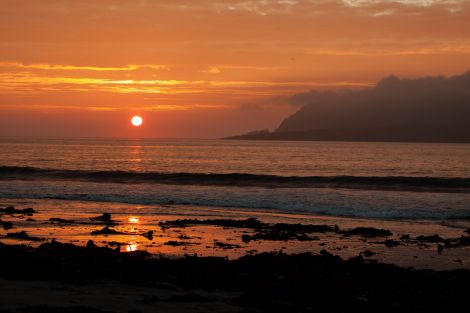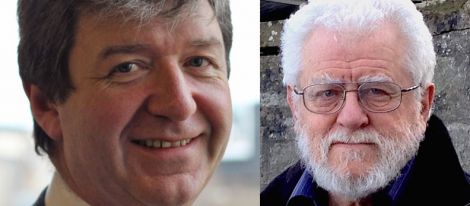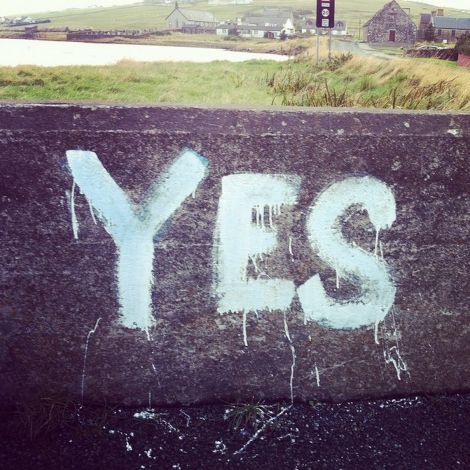Viewpoint / Election: Carmichael starts as firm favourite
THERE IS a faded slogan on a bridge in the tiny village of Walls on Shetland’s west side reading “Vote Liberal”. It dates back to the time of late Liberal leader Jo Grimond, and vote for him Shetlanders and Orcadians did, in droves.
In the ensuing decades they have continued voting for his successors too – without fail returning Liberals to Westminster and, since 1999, Holyrood. The Northern Isles has been painted orangey-yellow on the political map since the early 1950s.
Ask local political analysts why and no cast-iron explanation is forthcoming. Party critics put it down to comfort and apathy. But, perhaps tellingly, the Lib Dems have generally fielded candidates who went on to be assiduous constituency advocates.
Islanders are opinionated but not terribly partisan, and aside of a recent surge in SNP membership (numbers approaching 300 in Shetland alone), most other parties have little or no active presence. Fiercely patriotic locals seem distinctly unimpressed by candidates parachuted in from central Scotland.
During last summer’s referendum campaign an unidentified pro-indy supporter painted the letters “YES” alongside that “Vote Liberal” slogan. But anyone hoping it will herald the election of an SNP politician is liable to be disappointed.
Despite the party’s standing in national polls plummeting after five years in cahoots with the Tories in London, incumbent MP and Scottish secretary Alistair Carmichael is widely expected to retain the seat.
The Greens are sitting this one out, while Labour and the Tories having scarcely any firmer a foothold than UKIP in Scotland’s most northerly climes, meaning many observers view the only plausible alternative as SNP man Danus Skene.
Were he to upset the apple cart, 71-year-old Skene would become the UK’s oldest first-time MP since Frank Smith won Nuneaton in 1929.
Shetland and Orkney said no to independence by a fairly resounding margin last September. But Skene – himself a former Lib Dem parliamentary candidate – will look for the 30 per cent or so Yes voters to coalesce behind him.
Become a member of Shetland News
The mild-mannered, scholarly fellow’s varied career took him to Kenya to teach before he settled in Shetland. He requires a swing of more than 25 per cent to succeed and acknowledges Carmichael – who won a thumping 62 per cent of votes cast in 2010 – is the favourite.
“This is a huge ask, but I believe that it can be done,” Skene says. “We must bring people to question the role of the Lib Dems, and Mr Carmichael in particular, in promoting through the coalition a society of greater inequality, deteriorating standards of living, and plain unfairness in making the poor pay for the greed and mistakes of the bankers.”
But while Carmichael’s role in the Cameron/Osborne-led cabinet may alienate left-leaning voters in particular, he points to achievements such as a 5p reduction in fuel duty for isles residents and helping save the Northern Isles’ emergency rescue tug and Shetland’s coastguard station from the axe in 2011.
The Islay-born, Orkney-based lawyer has served as MP since replacing Jim Wallace in 2001. As a backbencher he cut his cloth fighting textbook modern liberal causes – representing Britons on death row in the US and fighting to save Thai-born lifeguard Sakchai Makao from Home Office deportation in 2006.
Inevitably criticism has mounted in the past five years. People question, for example, the potential damage privatising Royal Mail might cause in the long run for deliveries to some of the UK’s remotest postcodes.
Carmichael says it is obvious from local newspaper letters pages that some SNP supporters will target him in a “very negative and highly personalised campaign”.
Both island groups delivered “very clear verdicts that they wanted to remain part of the UK”, and he views this election as being “about how we continue the business of rebuilding and rebalancing the economy”.
He dismisses Skene’s criticism of the coalition as “predictable rhetoric”, adding many islanders view the SNP as a centralising government with a “pretty poor record” of helping society’s poorest.
“The SNP could have done an awful lot more with the powers they have,” Carmichael says. “Frankly they took their eye off the ball to campaign for independence and we’ve all suffered as a consequence.”
The fishing and energy industries have kept Shetland’s economy bubbling along nicely, not least through activity related to French energy giant Total’s much-delayed £1 billion new gas plant.
But a booming economy has not made the islands immune to social problems – and all that energy wealth can make what poverty and social exclusion there is seem all the more jarring.
Food banks in Lerwick and Kirkwall are in high demand. Many blame UK welfare cuts and sanctions, with Skene linking it to the “chastising of the less well-off” and the “current policy of austerity which denies hope and opportunity”.
The cost of living, with more expensive energy bills and transport, can be 30-40 per cent higher and “discrimination against islanders through pricing differentials must be overcome”, Skene says.
But it doesn’t mean islanders are leaping wholesale into the SNP’s open arms. Many were furious after the Holyrood administration handed the contract to run ferries to and from Aberdeen to much-maligned services provider Serco.
Tempers continue to run high about Viking Energy’s wind farm plans. Opinion is divided, but many opponents link the development to the SNP’s zeal for onshore renewables and blame them accordingly.
Others believe too much control is centralised to Edinburgh, a place every bit as distant as London for many – hence last year’s award-winning Our Islands Our Future (OIOF) initiative fought by the two local authorities alongside the Western Isles.
Contrary to some national media caricatures, OIOF was never some clarion call for independence – rather a modest scheme to wrest more devolved powers to island communities with unique needs.
Devolution under the Smith Commission must not stop in Edinburgh, islanders insist. There is tentative optimism that the UK and Scottish governments now accept control over income derived from the seabed – currently collected by the Crown Estate – should be handled locally.
Local historian Brian Smith bemoans the absence of party politics. Things would be “much more interesting if the other parties were active” outwith election campaigns: “When did we last hear from Labour or the Tories?”
Smith expects a swing from Lib Dem to SNP in the referendum’s wake, but does not envisage Carmichael’s colossal majority being overturned.
“There is a liberal hegemony, and every time I have known when it has been threatened then their share of the vote has gone up. I don’t see any likelihood Carmichael is going to lose the seat.”
Reverend Fraser McNaughton at St Magnus Cathedral in Kirkwall describes the campaign down in Orkney to date as “deafening in its silence”.
“You get the usual social media, which in a sense is an extension of the referendum spat,” McNaughton says, and a bit of “jockeying in terms of how can the OIOF campaign be highlighted or kept at the forefront of the campaign”.
Skene hopes the SNP is slowly winning voters over, ensuring the local media is peppered with press releases and letters advancing its cause after years of the Lib Dems having the field to themselves.
The OIOF campaign’s demands will be “fully met, and more”, he insists, though Carmichael suggests Scotland’s finance minister John Swinney may be less enthusiastic.
What of the other hopefuls?
The Tories offer High Court lawyer Donald Cameron, a Highlander extolling his party’s economic track record. He was a counsel to Sustainable Shetland in its legal bid to halt Viking Energy’s plans, so may hope to capitalise on opposition to the wind farm.
Labour fields Gerry McGarvey, parliamentary aide to Stirling MP Ann McGuire. He condemns the coalition’s failure to help “individuals, families or communities” and pledges his party will tackle the cost of living crisis.
Orkney fisherman Robert Smith saved his deposit with UKIP five years ago, but this time stands for the party “because I can’t find anyone else to do it primarily”.
Earlier this month a Mareel audience told Irish stand-up comedian Dylan Moran of the islands’ historic Lib Dem habit.
“Well that’s all over now,” he chortled, and many shook their heads in unison. Even if the party is routed everywhere else in May, in McNaughton’s words, few will be surprised if Orkney and Shetland remains “the last bastion of the Lib Dems in Scotland”.
Become a member of Shetland News
Shetland News is asking its readers to consider paying for membership to get additional perks:
- Removal of third-party ads;
- Bookmark posts to read later;
- Exclusive curated weekly newsletter;
- Hide membership messages;
- Comments open for discussion.
If you appreciate what we do and feel strongly about impartial local journalism, then please become a member of Shetland News by either making a single payment, or setting up a monthly, quarterly or yearly subscription.

































































